The politically dystopian classic highlights how we’re seemingly stuck in the systems we’re born into
By RUMA POUDELL — arts@theaggie.org
“1984” is a dystopian novel by George Orwell focused on politics and faith. The book details the journey of Winston, a rebel filled with lust for freedom of thought. Though published in 1949, many have said that the classic is still just as relevant today as it was when initially released.
The story takes place in a society run by “The Party,” which consists of the Ministry of Truth, Ministry of Peace and Ministry of Love. The three groups work together to uphold The Party’s power over civilians, but the extent to which The Party governs their people is daunting. There is something called the “Thought Police,” which monitors peoples’ whereabouts, expressions and any signs of thought that do not align with the values of The Party.
Orwell details ways in which The Party psychologically manipulates people. Families are turned against each other as children are trained to rat out any misconduct of parents. Affection or fondness towards another is extinguished through anti-love sex education and other forms of propaganda — since it may lead to passions that do not further The Party’s agenda.
Despite the extreme lengths that The Party goes to, Orwell ties the novel back to the real world. He writes about socialism, capitalism and how we are, all in a way, bound to the system just as Winston is stuck in his world governed by The Party. For example, he points out that war is constantly overfunded to keep the production and labor of people concentrated on irrelevant fights. This keeps resources away from areas such as education and health, which would lead to a more intelligent population that could overturn the system itself.
Other than in Winston’s own thoughts and diaries, where he lets rebellious thoughts manifest, his first introduction to rebellion is through a mysterious love interest, Julia. She’s introduced as a “spy” that Winston despises at first — that is until he receives a random note from her with “I love you” written on it.
As someone who usually finds fast-paced love stories distasteful, I actually enjoyed this one because there was an animalistic sense of passion to it — loving for the sake of loving and escaping from a world that is against the very thing you are doing. It’s especially interesting because Orwell emphasizes that their hookups are a political act — something comparable to modern-day hookup culture, which some find liberating, while others disagree.
What makes “1984” so enjoyable is Winston’s journey to find “The Brotherhood,” an organization that rebels against The Party.
As the book progresses, The Brotherhood introduces itself to Winston just as suddenly as love does. He meets an old friend who invites him to a meeting where he is given The Brotherhood’s book of ideology.
Just as hope arises that there may be a way out of the dystopian reign, the book does a complete turn, and it is revealed that the very friend who introduced Winston to the rebel group is the one who tortures him back into submission on behalf of The Party.
Throughout the book, Orwell emphasizes that Winston’s love for Julia is the one thing he will never betray. While being tortured, he is subject to pain, fear and forced confessions of treason. Holding on for lengths of time unknown for certain, he becomes frail and weak. Finally, after The Party subjects him to his greatest fear, he gives up and begs for his lover to be tortured instead.
Upon reading how Winston and his love both end up betraying each other to ensure their own survival, “1984” leaves you wondering what, and who, to put your faith in, as well as to what extent you would go to keep said faith intact and for what reasons. Would you stick with it even if there was no way for your dreams or beliefs to come to fruition, just as Winston’s dream of living without constant surveillance? Or would you prioritize survival at the cost of your free will?
Written by: Ruma Poudell — arts@theaggie.org






